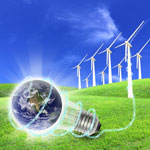
This flagship ADF PRG will support the Lake Turkana Wind Power Project in Kenya. Africa's biggest wind power project, it involves the development of a 300MW wind farm comprising 365 wind turbines of 850kW capacity each and a 33kV electrical network. The average electricity production of the project is estimated at 1,440GWh per year, equivalent to the annual generation capacity of Namibia in 2010, and will be sold to the grid at a price of 0.0752 €/Kwh.
Under the wind project, the Lake Turkana Transmission Line Delay PRG will be used to alleviate the risk for the construction of a 428km publicly owned transmission line between Loyangalani and Suswa and associated substations needed to connect the project to the national grid. The PRG will support the Kenyan government's on-time delivery of the transmission line and will reduce the risk of it being unable to meet payment obligations. More specifically, the ADF PRG will provide partial risk mitigation to Lake Turkana Wind Power Limited and the providers of debt financing to the project for risks associated with construction delays.
The objective of the Lake Turkana Wind Power Project is to provide clean, reliable, low-cost power and to strengthen Kenya's national grid by increasing national installed power by approximately 17%. The transmission line will also include a fibre-optic cable that will carry communications data. Over the long term, the project will help decrease the cost of energy to end-users, increase access to energy in rural areas, increase the national electrification rate, reduce CO2 emissions, and decrease fossil fuel dependence.
There is growing demand for electricity in Kenya. In the context of the importance of low-cost generation capacity additions and regional power interconnections for supply security, particularly during periods of severe drought, the government of Kenya has traditionally relied upon providers of emergency generation capacity, which has the advantage of a rapid installation time, but is very expensive and load shedding frequently occurs.
The AfDB Group provided a €115m loan to the Lake Turkana project and has led its development since 2009. Speaking after the board meeting, Kurt Lonsway, acting director of the AfDB's Energy, Environment and Climate Change Department, said the ADF PRG will promote foreign direct investment in Kenya. Also, by reducing the risk profile for the sponsors of and lenders to the Lake Turkana project, the PRG will accelerate financial closure and reduce the overall cost of capital to the project.